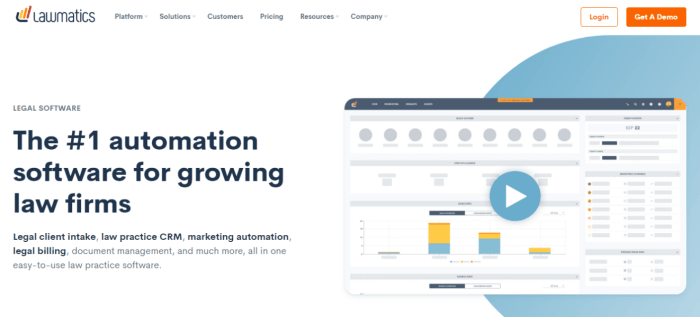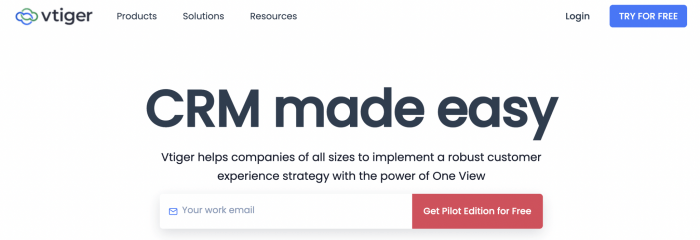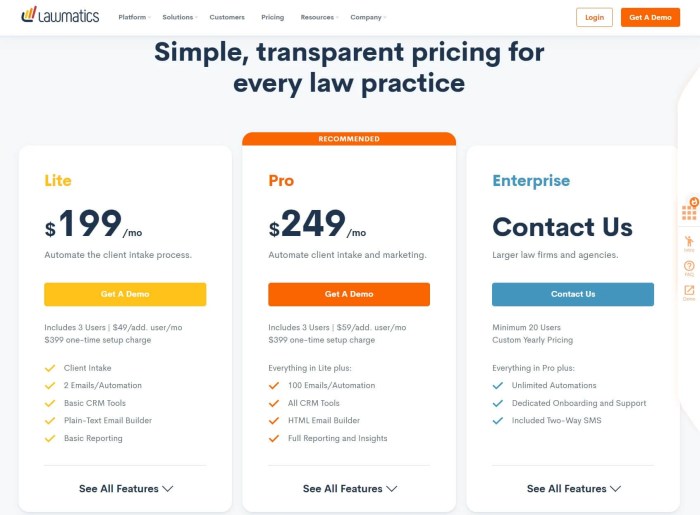CRM software for law firms is revolutionizing how legal professionals manage client relationships and cases. Efficiently tracking client interactions, managing deadlines, and automating tasks are now achievable through integrated systems designed to meet the unique demands of the legal field. This allows firms to focus more on legal strategy and less on administrative overhead, ultimately improving client service and profitability.
These systems offer a range of features, from contact management and case tracking to document storage and reporting. By centralizing crucial information, CRM software enhances collaboration within the firm and improves communication with clients. This leads to better organization, reduced errors, and increased efficiency throughout the entire legal process. The right CRM can significantly impact a firm’s overall success.

Source: webfx.com
In today’s competitive legal landscape, efficient client management is paramount. Law firms, regardless of size, can significantly benefit from implementing a robust Customer Relationship Management (CRM) system. A well-chosen CRM software solution can streamline operations, improve client communication, enhance case management, and ultimately, contribute to increased profitability. This comprehensive guide delves into the key aspects of CRM software tailored for law firms, offering insights to help you choose the right solution for your practice.
Understanding the Benefits of CRM for Law Firms
Beyond simple contact management, a dedicated legal CRM offers a range of advantages that directly impact a firm’s success. These benefits extend beyond basic contact organization and encompass several key areas:
Improved Client Communication and Relationship Management
- Centralized Communication: Consolidate all client interactions – emails, phone calls, meetings, and documents – in one accessible location. This ensures everyone on the team is on the same page and prevents crucial information from being missed.
- Enhanced Client Service: Track client preferences, deadlines, and communication history to provide personalized and timely service, fostering stronger client relationships.
- Automated Communication: Schedule automated emails and reminders for appointments, deadlines, and follow-ups, saving time and ensuring consistent communication.
- Client Portals: Many CRM systems offer secure client portals, allowing clients to access case files, documents, and communicate directly with their legal team, increasing transparency and efficiency.
Streamlined Case Management and Workflow Automation
- Centralized Case Files: Store all case-related documents, notes, and communications in a secure, centralized repository, easily accessible to authorized personnel.
- Automated Workflows: Automate repetitive tasks like assigning tasks, sending reminders, and generating reports, freeing up valuable time for lawyers and staff to focus on higher-value activities.
- Improved Collaboration: Facilitate seamless collaboration among team members by providing a shared platform for accessing case information and tracking progress.
- Deadline Management: Set and track deadlines for various tasks and milestones associated with each case, minimizing the risk of missed deadlines and potential penalties.
Increased Efficiency and Productivity, Crm software for law firms
- Time Tracking and Billing: Accurately track time spent on each case and automate billing processes, improving accuracy and reducing administrative overhead.
- Reporting and Analytics: Generate insightful reports on key performance indicators (KPIs), such as client acquisition costs, case win rates, and revenue generated, providing data-driven insights for strategic decision-making.
- Reduced Administrative Burden: Automate repetitive tasks, reducing administrative burden on staff and allowing them to focus on more strategic responsibilities.
- Improved Resource Allocation: Optimize resource allocation by tracking workload and identifying potential bottlenecks, ensuring efficient utilization of personnel and resources.
Key Features to Look for in a Law Firm CRM: Crm Software For Law Firms
When selecting a CRM for your law firm, consider the following essential features:
Essential Features:
- Contact Management: Robust contact management capabilities with detailed client profiles, including contact information, communication history, and case details.
- Case Management: A comprehensive system for managing cases, including task assignment, deadline tracking, and document storage.
- Document Management: Secure storage and management of legal documents, ensuring easy access and version control.
- Time Tracking and Billing: Accurate time tracking and automated billing features to streamline financial management.
- Reporting and Analytics: Detailed reports and analytics to track key performance indicators and make data-driven decisions.
- Integration Capabilities: Seamless integration with other essential software, such as email clients, accounting software, and document management systems.
- Security and Compliance: Robust security features to protect sensitive client data and ensure compliance with relevant regulations, such as GDPR and HIPAA.
- Mobile Accessibility: Access to the CRM system from any device, allowing for flexibility and on-the-go access to client information and case details.
Advanced Features (Consider based on firm size and needs):
- Client Portals: Secure portals for clients to access case information and communicate with their legal team.
- Workflow Automation: Automated workflows to streamline repetitive tasks and improve efficiency.
- Legal-Specific Templates and Forms: Pre-built templates and forms for common legal tasks.
- Matter Management: Advanced matter management capabilities for complex cases.
- Conflict Checking: Tools to identify and prevent conflicts of interest.
Choosing the Right CRM for Your Law Firm
Selecting the appropriate CRM involves careful consideration of your firm’s specific needs and budget. Factors to consider include:
- Firm Size and Structure: A small firm may require a simpler solution than a large firm with multiple offices and specialized practice areas.
- Budget: CRM software comes in various price points, from affordable cloud-based solutions to more expensive enterprise-level systems.
- Integration Requirements: Consider the need for integration with existing software systems.
- User-Friendliness: Choose a system that is intuitive and easy for your staff to use.
- Scalability: Select a system that can grow with your firm as your needs evolve.
- Customer Support: Ensure the vendor offers reliable customer support and training.
Popular CRM Software Options for Law Firms
Several CRM platforms cater specifically to the needs of law firms. Researching different options and comparing features is crucial. Some popular choices include (Note: This is not an exhaustive list and specific features and pricing may vary):
- CaseText: Known for its legal research capabilities and integration with other legal tech tools.
- Clio Manage: A popular cloud-based CRM designed specifically for law firms, offering robust case management and billing features.
- MyCase: Another popular cloud-based option with a strong focus on client communication and case management.
- PracticePanther: A comprehensive CRM with time tracking, billing, and client portal features.
- CosmoLex: A comprehensive solution with a focus on legal billing and accounting.
Frequently Asked Questions (FAQs)
- Q: How much does CRM software for law firms cost? A: Pricing varies significantly depending on the features, number of users, and vendor. Expect to pay anywhere from a few hundred dollars per month to several thousand dollars per month for enterprise-level solutions.
- Q: Is CRM software difficult to learn? A: Most modern CRM systems are designed to be user-friendly. However, the learning curve may vary depending on the complexity of the software and your staff’s technical skills. Many vendors offer training and support.
- Q: Can CRM software integrate with my existing accounting software? A: Many CRM systems offer integration with popular accounting software. Check the vendor’s specifications to ensure compatibility.
- Q: How can I ensure the security of client data in a CRM system? A: Choose a CRM vendor that prioritizes data security and compliance with relevant regulations. Look for features such as data encryption, access controls, and regular security audits.
- Q: What are the key metrics to track with a law firm CRM? A: Key metrics include client acquisition cost, case win rate, average revenue per client, time spent on tasks, and billing efficiency.
Conclusion
Implementing a CRM system is a strategic investment that can significantly enhance the efficiency and profitability of your law firm. By streamlining operations, improving client communication, and providing data-driven insights, a well-chosen CRM can contribute to your firm’s long-term success. Take the time to research different options, consider your firm’s specific needs, and choose a solution that will empower your team and elevate your client relationships.
Call to Action
Ready to transform your law firm’s operations? Contact us today for a free consultation to discuss your specific needs and explore the best CRM solutions for your practice.
In conclusion, adopting CRM software represents a strategic move for modern law firms seeking to optimize their operations and enhance client satisfaction. By streamlining workflows, improving communication, and providing valuable data-driven insights, these systems offer a significant competitive advantage in today’s demanding legal landscape. The benefits extend beyond simple organization, contributing to a more profitable and sustainable future for the firm.
General Inquiries
What types of law firms benefit most from CRM software?
Firms of all sizes, from solo practitioners to large corporations, can benefit. However, those with a high volume of clients or complex cases will see the most significant improvements in efficiency and organization.

Source: teamwave.com
How much does CRM software for law firms typically cost?
Pricing varies greatly depending on the features, number of users, and vendor. Expect to find options ranging from affordable monthly subscriptions to more expensive enterprise solutions.
What are some key features to look for when choosing CRM software?
Essential features include contact management, case management, document storage, calendaring, reporting and analytics, and integration with other legal software.
Is CRM software difficult to learn and implement?
Many CRM systems offer user-friendly interfaces and training resources. The implementation process varies, but reputable vendors often provide support to ensure a smooth transition.
How does CRM software improve client relationships?

Source: contentmavericks.com
By providing a centralized view of client interactions and case details, CRM allows for personalized communication and more efficient service. This leads to increased client satisfaction and loyalty.
